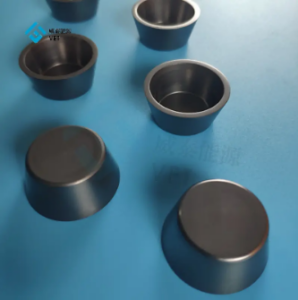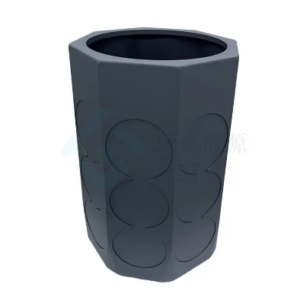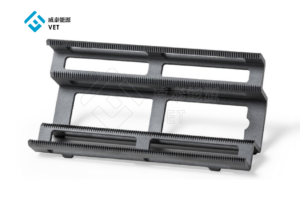シリコンカーバイドセラミック 注目すべき特性を持つ業界に革命を起こしています。 極度な温度への高い引張強さそして抵抗のために知られているこの材料は、現代技術の進歩の重要な役割を担います。 自動車、航空宇宙、エネルギーなどの産業は、自動車、航空宇宙、エネルギーなどの重要な変化を経験しています 炭化ケイ素(SiC)お問い合わせ 市場のための silicon carbide セラミックスは大きく成長し、到達する 2032年までのUSD 2.03億. . この成長は、SiCの独自機能の需要増加を加速し、効率性と耐久性を高め、さまざまな用途で不可欠です.

要点
- 炭化ケイ素の陶磁器は自動車、大気および宇宙空間およびエネルギーを含む複数の企業を渡るゲーム チェンジャーです 高い引張強さ そして温度の抵抗.
- パワーエレクトロニクスでは、炭化ケイ素は高めます エネルギー効率 装置がより高い電圧および温度で作動させることによって、より小さく、より信頼できるシステムに導きます.
- 炭化ケイ素の自動車産業はより速い電池の充満を可能にする間、電気自動車の性能、増加の範囲および効率を改善する能力から寄与します.
- 航空宇宙用途は、シリコンカーバイドを採用し、軽量で高強度な特性を実現し、燃費と強靭な航空機設計に貢献します.
- エネルギー部門では、炭化ケイ素はソーラーパネルの効率を著しく向上し、耐腐食性を通じて核原子炉コンポーネントの長寿を保証します.
- シリコンカーバイドセラミックスは、医療分野において不可欠であり、外科的ツールや診断機器にバイオコンパシブルで耐久性のある材料を提供し、患者の安全とケアを強化しています.
- 防衛産業は軽量で耐久の装甲解決のために炭化ケイ素を利用し、軍の人員および装置の安全そして有効性を改善します.
エレクトロニクス産業
パワーエレクトロニクス
パワーデバイスにおける効率性の向上
炭化ケイ素の陶磁器は電力電子工学の分野のゲーム・チェンジャーになりました。 その広いバンドギャップは装置がより高い電圧および温度で作動することを、かなり高めるエネルギー効率を可能にします。 パワーコンバータ、MOSFET、ダイオードなどではますます使用されています。 これらのアプリケーションは、より小さく、より軽く、より効率的な電子システムにつながります。 ザ・オブ・ザ・ 高い熱伝導性 そして炭化ケイ素の陶磁器の低い熱拡張係数はそれにこれらの高性能装置のための理想的な選択をします。 高温で効率的に機能する装置を可能にすることにより、炭化ケイ素セラミックスはエネルギー損失を減らし、システム全体の信頼性を向上させます.
Case Study: Ningbo VET Energy Technology Co.’s Innovations
ニンポー VET エネルギー技術 Co. は、トランスフォーメーションの影響を変化させる 炭化ケイ素の陶磁器 パワーエレクトロニクス。 当社は、シリコンカーバイドセラミックスをはじめとする最先端材料の研究開発に注力しています。 太陽光発電や半導体業界に広く使用されている製品は、シリコンカーバイドセラミックが提供する強化された効率性と耐久性を示しています。 シリコンカーバイドのユニークな特性を活かし、Ningbo VET Energy Technology Co.(ニンポー VET Energy Technology Co.)は、近代的な技術の要求に応える最先端電源装置を開発しました.
半導体アプリケーション
高温度環境でのパフォーマンス向上
半導体用途では、高温環境での性能を維持するため、炭化ケイ素セラミックスが際立っています。 酸化に対する優れた熱伝導性と抵抗性により、電子機器の基質に適した材料となります。 高温での電気的特性を維持する高出力および高周波アプリケーションにとってこの機能は不可欠です。 シリコンカーバイドセラミックの堅牢性は、デバイスが劣化することなく確実に動作できるようにします。極端な条件下でも.
例:マイクロチップの炭化ケイ素
マイクロチップのシリコンカーバイドセラミックの役割は、半導体製造の重要性を示しています。 材料の高い熱伝導率および低い熱拡張係数はマイクロチップの生産のための安定したプラットホームを提供します。 この安定性は、電子部品の精度と信頼性を確保するために不可欠です。 技術の進歩として、マイクロチップの炭化ケイ素の陶磁器の要求は成長し続けま、電子工学の企業の意義を強調します.
自動車産業
電気自動車
範囲および効率を高めて下さい
シリコンカーバイドセラミック 電気自動車(EV)の性能を高める上で重要な役割を果たします。 この材料の優れた熱伝導性と高い重要な電界強度により、より効率的な電力管理が可能になります。 高温の操作を簡単な冷却制御で可能にすることで、炭化ケイ素の陶磁器はEVの範囲そして効率を高めます。 より高い電圧に耐える能力は、現代の電気自動車にとって不可欠である高速バッテリー充電を容易にします。 その結果、自動車メーカーはますますシリコンカーバイドチップを採用し、EVの全体的な性能と信頼性を向上させます.
ケーススタディ:EVパワートレインで炭化ケイ素
電気自動車の領域では、炭化ケイ素セラミックはパワートレインシステムに不可欠になりました。 会社は優秀な効率および耐久性を達成するために設計にこの材料を統合しました。 たとえば、大手自動車メーカーはEVパワートレインでシリコンカーバイドを活用してエネルギー変換を高め、熱損失を削減しました。 この統合は、車両の範囲を高めるだけでなく、より持続可能な環境に優しい運転経験を保証します。 EVパワートレインにおける炭化ケイ素セラミックの採用は、その変化に影響を及ぼす 自動車産業.
エンジン部品
耐久性および熱抵抗
シリコンカーバイドセラミックは、優れた耐久性と耐熱性で有名で、エンジン部品に最適です。 摩耗および腐食への高い熱伝導性および抵抗は、エンジン部分が劣化なしで極端な条件に耐えることができることを保障します。 この材料の堅牢性は、高い応力と温度下でも性能を維持するコンポーネントの開発を可能にします。 その結果、シリコンカーバイドセラミックは、信頼性と長寿がパラマウントされる高度な自動車用途で広く使用されています.
例:ターボチャージャーの炭化ケイ素
ターボチャージャーは炭化ケイ素の陶磁器の使用からかなり寄与します。 高温やレジスト摩耗に耐えるこの材料の能力は、ターボチャージャーコンポーネントに最適です。 シリコンカーバイドを組み込むことで、性能と効率性を高めるターボチャージャーを生産できます。 材料の特性はターボチャージャーが滑らかに作動することを保障しま、高められた出力および燃料効率を提供します。 このアプリケーションは、自動車エンジンコンポーネントの改善において、炭化ケイ素セラミックの汎用性と有効性を強調しています.
航空宇宙産業
構造部品
軽量・高強度材料
の中で 航空宇宙産業軽量化と高強度化の両立材料の要求はパラマウントです。 炭化ケイ素の陶磁器は例外的な特徴とこれらの条件を満たします。 耐酸化性に優れ、高温での強度を維持し、航空宇宙用途に最適です。 その化学的安定性および熱衝撃抵抗は航空機の部品の使用のための適合性を更に高めます。 炭化ケイ素の陶磁器を利用することによって、エンジニアはより軽いだけでなく、より強く、改良された燃料の効率および性能に導く航空機を設計できます.
例:航空機設計における炭化ケイ素
航空機設計者は、シリコンカーバイドセラミックスに、そのユニークな特性を加わりました。 たとえば、この材料の高熱伝導率と低熱膨張係数は、構造コンポーネントの優れた選択です。 航空機設計では、シリコンカーバイドセラミックは、構造的完全性を維持しながら、飛行の厳しさに耐えることができる部品の開発に貢献します。 このアプリケーションは、より効率的で信頼性の高い航空機を作成するために、炭化ケイ素セラミックの変形の影響をアンダースコアします.
熱保護システム
Resistance to Extreme Temperatures
炭化ケイ素の陶磁器は重要な役割をで担います 熱保護システム 航空宇宙分野内。 極端な温度に抵抗し、熱応力下で構造的完全性を維持する能力は、宇宙船を保護するために不可欠です。 材料の高温強さおよび熱伝導性はスペース旅行の粗い条件からの効果的に保護された敏感な部品できることを保障します。 この機能は、航空宇宙ミッションの安全と成功を保証するために不可欠です.
ケーススタディ:宇宙船で炭化ケイ素
宇宙空間における炭化ケイ素セラミックの応用例は、宇宙船での使用です。 エンジニアはこの材料を熱保護システムで採用し、地球の大気への再入国中に宇宙船を保護しています。 酸化および熱衝撃への陶磁器の抵抗はそれがこの段階の間に経験される激しい熱そして圧力に耐えることができることを保障します。 シリコンカーバイドセラミックを組み込むことで、宇宙船のデザイナーは、航空宇宙技術の進歩に重要な役割を発揮する、その使命の信頼性と安全性を高めます.
エネルギー産業
太陽エネルギー
太陽電池の高効率化
シリコンカーバイドセラミックは、太陽電池の効率を大幅に向上させます。 この材料の高い熱伝導率および低い熱拡張係数は太陽エネルギーの適用にとって理想的です。 シリコンカーバイドセラミックは、光起電細胞が高温で効率的に動作し、エネルギー損失を減らし、全体的なパフォーマンスを向上させることができます。 熱衝撃へのその優秀な抵抗は細胞が環境条件を洗い流すことの下の彼らの完全性および機能性を維持することを保障します。 炭化ケイ素の陶磁器を組み込むことによって、太陽エネルギー システムより大きい達成できます エネルギー転換率、それらをより有効および信頼できるようにします.
例:ソーラーパネルのシリコンカーバイド
太陽電池パネルは炭化ケイ素の陶磁器の統合から非常に寄与します。 この材料の特性により、パネルは過酷な気象条件に耐えることができ、時間の経過とともに高効率を維持することができます。 例えば、酸化および化学的安定性に対する炭化ケイ素の抵抗は、ソーラーパネルが腐食性環境でも耐久性と効果的であることを保証します。 ソーラーパネルの炭化ケイ素セラミックの使用は、エネルギー業界に変化する影響を発揮し、太陽光発電の活用のための持続可能なソリューションを提供します.
原子力エネルギー
原子炉の部品の耐食性
原子力エネルギー適用では、, 炭化ケイ素の陶磁器 反応器の部品のための理想的な選択をする例外的な耐食性を提供します。 その化学慣性および高い融点は、核原子炉内の極端な条件に耐えることを可能にします。 炭化ケイ素の陶磁器は水、蒸気およびさまざまな化学薬品からの腐食に抵抗する能力は原子炉の部品の長寿そして信頼性を保障します。 この材料の堅牢性は、原子力発電所の安全で効率的な運用に貢献し、エネルギー分野の重要性を強調しています.
事例:核原子炉における炭化ケイ素
原子力産業における炭化ケイ素セラミックの注目の応用は、原子炉部品の使用です。 原子力原子炉の耐久性と安全性を高めるために、この材料を活用しました。 シリコンカーバイドの弾性率とゼロの気孔率は、原子炉内の激しい圧力と温度に耐えるのに特に適しています。 炭化ケイ素セラミックスを組み込むことで、原子力施設は、原子力エネルギー技術の発展に重要な役割を発揮する、その性能と安全性を向上させることができます.
化学産業
腐食抵抗剤装置
ハーシュ化学環境の長寿
炭化ケイ素の陶磁器は例外的な化学工業で際立っています 耐食性. . この材料のユニークな特性は、過酷な化学環境で使用される機器に最適です。 シリコンカーバイドセラミックは、積極的な化学物質、高温、機械的ストレスに耐えることができ、装置の長寿を保証します。 酸化への高い引張強さそして抵抗は耐久性に寄与し、信頼できる、長続きがする解決を要求する企業のための好まれた選択をします.
Expert Testimony:
「シリコンカーバイドセラミックスは、石油化学産業の耐腐食性容器やパイプラインとして広く使用されている」と、セラミックスの専門家が指摘しています。 他の材料が失敗する環境の材料の有効性を強調します.
例:化学加工における炭化ケイ素
In 化学加工、炭化ケイ素の陶磁器は重要な役割を担います。 容器およびパイプラインのその適用は装置が長期にわたってそのままそして機能残っていることを保障します。 摩耗や腐食に抵抗するこの材料の能力は、過酷な化学物質を含むプロセスに不可欠です。 炭化ケイ素の陶磁器を使用することによって、会社は維持費を削減し、運用効率を改善できます、化学工業の変形的な影響を実証します.
ろ過システム
高性能ろ過ソリューション
炭化ケイ素の陶磁器のまたろ過システムでexcels。 高い熱伝導性および化学的安定性により、高性能ろ過ソリューションに適しています。 この材料は、ろ過システムが効率的にそして効果的に作動することを保障する極度な条件を扱うことができます。 シリコンカーバイドセラミックの堅牢性により、劣化することなく不純物をフィルタリングし、精度と信頼性を要求する業界に信頼できるソリューションを提供します.
ケーススタディ:産業フィルターで炭化ケイ素
炭化ケイ素の陶磁器の顕著な適用は産業フィルターです。 会社はろ過システムの性能そして耐久性を高めるためにこの材料を採用します。 炭化ケイ素の化学攻撃および熱衝撃への抵抗はフィルターが彼らの完全性および機能性を維持することを保障します。 このアプリケーションは、材料の多様性と産業プロセスの改善の有効性を強調し、ろ過技術の進歩に重要な役割を果たしています.
防衛産業
装甲および保護ギヤ
軽量で耐久性のあるソリューション
シリコンカーバイドセラミック 防衛産業に革命をもたらし、特に装甲および保護ギヤの開発で。 この材料は、軽量性と優れた耐久性のユニークな組み合わせを提供し、軍事用途に最適です。 兵士は、可動性を妨げずに最大の保護を提供する鎧を必要とします。 炭化ケイ素の陶磁器は極度な条件に高い引張強さおよび抵抗を提供することによってこの必要性を満たします。 エネルギーを吸収し、排出する能力は効果的に戦闘状況の人員の安全を高めます.
「反応ボンドまたは反応形成炭化ケイ素は、1960年代に、候補者の装甲材料として提案され、評価されています。」と、防衛用途の長期にわたる可能性を強調しています.
例: 軍用用途における炭化ケイ素
世界的な軍隊はさまざまな保護適用のための炭化ケイ素の陶磁器を採用します。 例えば、この材料はボディ装甲版、ヘルメットおよび車の装甲で使用されます。 その軽量な性質は、動きの容易さを確保しながら保護に妥協しないギヤの生産を可能にします。 軍事用途における炭化ケイ素セラミックの統合は、防衛操作の安全性と有効性を高める上で重要な役割を果たしています.
高度な武器
性能と信頼性の向上
高度の兵器では、炭化ケイ素の陶磁器の演劇は性能および信頼性を改善する重要な役割を担います。 高温および機械的圧力に耐えることができる武器システム要求材料。 シリコンカーバイドセラミックは、その理由でこれらの領域で優れています 高い熱伝導性 摩耗への抵抗。 この材料は、極端な条件下でも、武器が効率的かつ確実に動作するようにします。 堅牢性は、高度な兵器技術の長寿と有効性に貢献し、現代の防衛技術に不可欠です.
ケーススタディ:防衛システムで炭化ケイ素
防衛システムの炭化ケイ素の陶磁器の顕著な適用はミサイルの部品およびレーダー システムの使用です。 エンジニアは、これらの重要なシステムのパフォーマンスと耐久性を向上させるために、この材料を利用しました。 シリコンカーバイドは、高いストレスと温度条件下で構造的整合性を維持できる能力で、防御システムが動作し、効果的であることを保証します。 このアプリケーションは、防衛技術の進歩における炭化ケイ素セラミックの変革の影響を強調し、国家安全保障のための信頼性の高いソリューションを提供します.
医療業界
医療機器
生体適合性および耐久性
シリコンカーバイドセラミックは、先進医療機器の開発に礎石になりました。 その生体適合性は、それが人間の組織と接触して安全に使用できることを保証し、それは外科的ツールやインプラントのための理想的な材料になります。 シリコンカーバイドセラミックの耐久性により、これらのデバイスは、劣化せずに繰り返し滅菌プロセスに耐えることができ、長期的な信頼性と性能を保証します。 医学の専門家は強調します 材料の使用の重要性 厳しい条件下でその完全性を維持し、炭化ケイ素の陶磁器は例外的な硬度および化学抵抗とこれらの要求を満たします.
例: 外科用具の炭化ケイ素
炭化ケイ素の陶磁器から成っている外科用具は医学の技術の材料の変形の影響をexemplifyします。 これらのツールは、セラミックの高い熱伝導性と耐摩耗性から恩恵を受け、サージョンが精密で自信を持って手順を実行できるようにします。 炭化ケイ素の陶磁器の器械の鋭さそして強さは重要な操作の間に用具の失敗の危険を減らします、忍耐強い安全および外科的結果を高めます。 その結果、病院やクリニックはますますシリコンカーバイドセラミックツールを採用し、患者に提供されるケアの質を向上させることができます.
診断装置
精密・信頼性
診断装置、精密および信頼性はパラマウントです。 シリコンカーバイドセラミックは、画像技術の安定的かつ堅牢なプラットフォームを提供することで、これらの属性に著しく貢献します。 その高い熱伝導性は診断装置が効果的に作動することを、摩耗および腐食の保証の長寿への抵抗保障する間保障します。 医療専門家は、常に正確な結果をもたらす機器に依存し、炭化ケイ素セラミックスは、これらの期待を満たす上で重要な役割を果たしています.
ケーススタディ:イメージング技術の炭化ケイ素
シリコンカーバイドセラミックの注目の応用は、MRIマシンやCTスキャナーなどのイメージング技術です。 これらの装置は性能を妥協しないで高温および機械圧力に耐えることができる材料を要求します。 シリコンカーバイドセラミックのユニークな特性により、これらのシステム内のコンポーネントの理想的な選択が可能になり、時間とともに確実に機能します。 炭化ケイ素の陶磁器を組み込むことによって、製造業者は診断装置の精密そして耐久性を高めます、最終的に忍耐強い診断および処置を改善します.
シリコンカーバイドセラミックは、その優れた特性を持つ多くの業界に革命をもたらしました。 高熱伝導性、酸化への抵抗、耐久性は、電子機器から航空宇宙に至るまでの用途に不可欠です。 業界は、性能を損なうことなく極端な条件に耐える能力の恩恵を受けています。 技術の進歩に伴い、シリコンカーバイドセラミックスの継続的な革新は、より大きな可能性を約束します。 この材料の変革の可能性は、さまざまな分野にわたって効率と信頼性を高めるソリューションを提供し、進行を続けています.
よくあるご質問
炭化ケイ素セラミックスの使用は何ですか?
シリコンカーバイドセラミックスは、その例外的な特性のために、目的の多岐にわたる機能を提供します。 顕著な硬度および高い熱伝導性のために知られて、これらの陶磁器は抵抗の腐食および摩耗で excel。 これらの属性は、さまざまな業界におけるさまざまなアプリケーションに理想的です.
炭化ケイ素の陶磁器の適用は何ですか?
シリコンカーバイドセラミックス 優れた特性を借りて、多くのフィールドで広範な使用を見つける。 耐酸化性に優れ、高温での強度を維持します。 化学的安定性および熱衝撃抵抗は、そのユーティリティをさらに高めます。 エネルギー、冶金学、機械、石油、化学薬品、航空、大気および国民の防衛のような企業はこれらの陶磁器から寄与します.
炭化ケイ素の陶磁器材料の特徴は何ですか?
炭化ケイ素の陶磁器の材料は複数の優秀な特徴を自慢します。 高温強度・耐摩耗性に優れています。 小さな熱膨張係数と高硬度は、要求環境に適したものになります。 また、熱衝撃や化学腐食に抵抗します。 これらの特徴は、自動車、機械、化学工業、ならびに環境保護、宇宙技術、情報電子機器に不可欠です.
シリコンカーバイドセラミックスが自動車業界にどのように貢献しますか?
自動車分野では、炭化ケイ素の陶磁器は性能および耐久性を高めます。 摩耗への高い熱伝導性および抵抗はそれらにエンジンの部品および電気自動車のパワートレインにとって理想的にします。 これらのセラミックスは、自動車技術の進歩に貢献し、効率と信頼性を向上させます.
航空宇宙業界で重要な炭化ケイ素セラミックスはなぜですか?
シリコンカーバイドセラミックスは、航空宇宙用途において重要な役割を果たしています。 軽量で高強度な特性により、構造的な部品に適しています。 それらはまた宇宙船および航空機の安全そして信頼性を保障する優秀な熱保護を提供します.
炭化ケイ素の陶磁器がエネルギー企業に影響を与える方法か?
炭化ケイ素の陶磁器からのエネルギー企業利点かなり。 太陽光発電システムでは、太陽電池の効率性を高めます。 原子力原子炉では、その耐食性は、原子炉コンポーネントの長寿と安全性を保証します。 これらのセラミックスは、持続可能な効率的なエネルギーソリューションに貢献します.
炭化ケイ素の陶磁器は化学工業で何をしますか?
化学工業では、炭化ケイ素の陶磁器は耐食性のために際立っています。 それらは粗い化学環境で使用される装置の長寿を保障します。 耐久性は維持費を削減し、運用効率を改善し、化学加工の好ましい選択をします.
シリコンカーバイドセラミックスは、防衛産業でどのように活用されていますか?
シリコンカーバイドセラミックスは、防護用ギヤや防護ギアの軽量で耐久性のあるソリューションを提供することで、防衛業界に革命を起こしています。 極端な条件に対する高い引張強さと抵抗は、軍事用途の安全性と有効性を高めます.
シリコンカーバイドセラミックスは、医療用途にどのような利点がありますか?
医学分野では、炭化ケイ素の陶磁器は生物適合性および耐久性を提供します。 それらは外科用具および注入で使用され、長期信頼性および性能を保障します。 摩耗および腐食への彼らの抵抗はそれらを診断装置、高める精密および信頼性のために理想的にします.
シリコンカーバイドセラミックスが技術の進歩にどのように貢献しますか?
シリコンカーバイドセラミックスは、さまざまな業界における技術の進歩を推進しています。 優れた特性により、高性能デバイスやシステムの開発が可能になります。 技術の進化に伴い、これらのセラミックスは、効率と信頼性を高める革新的なソリューションを提供します.







